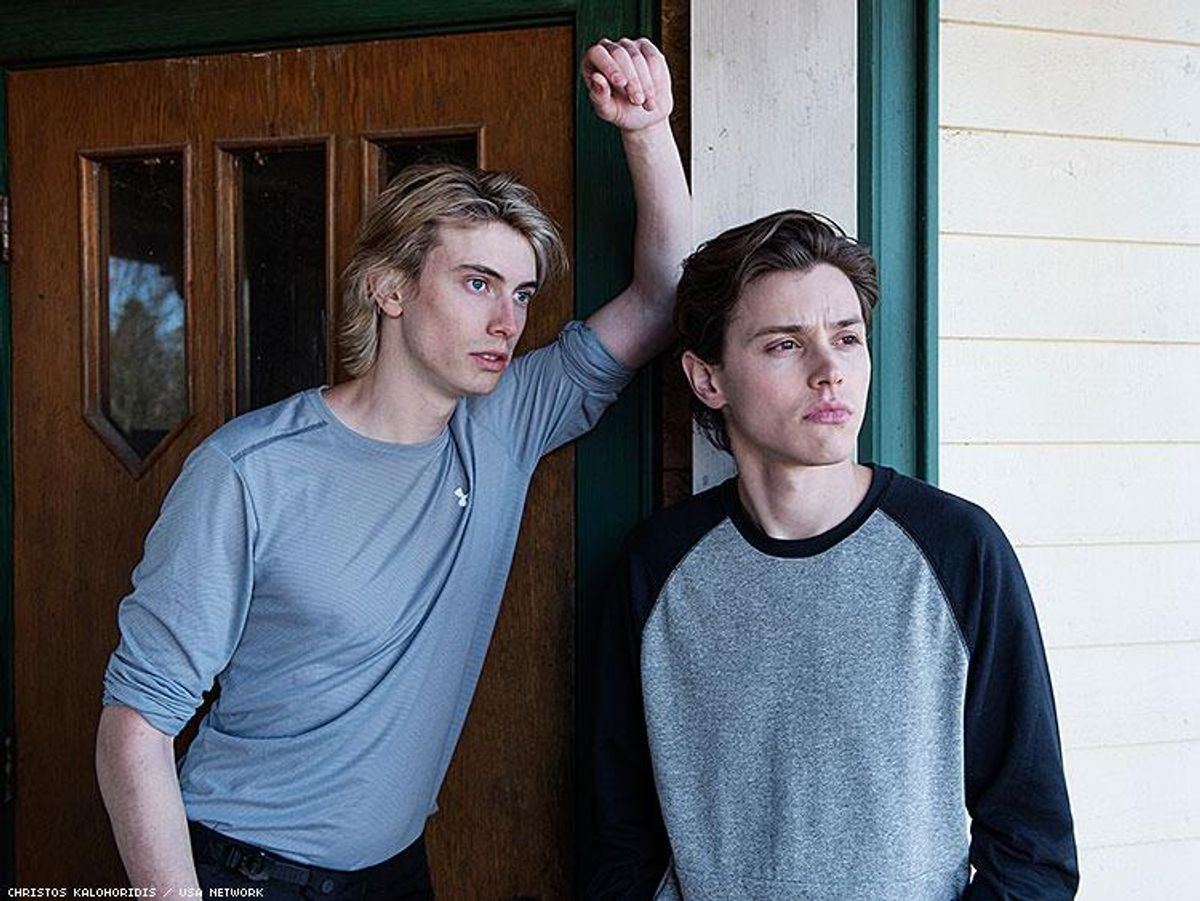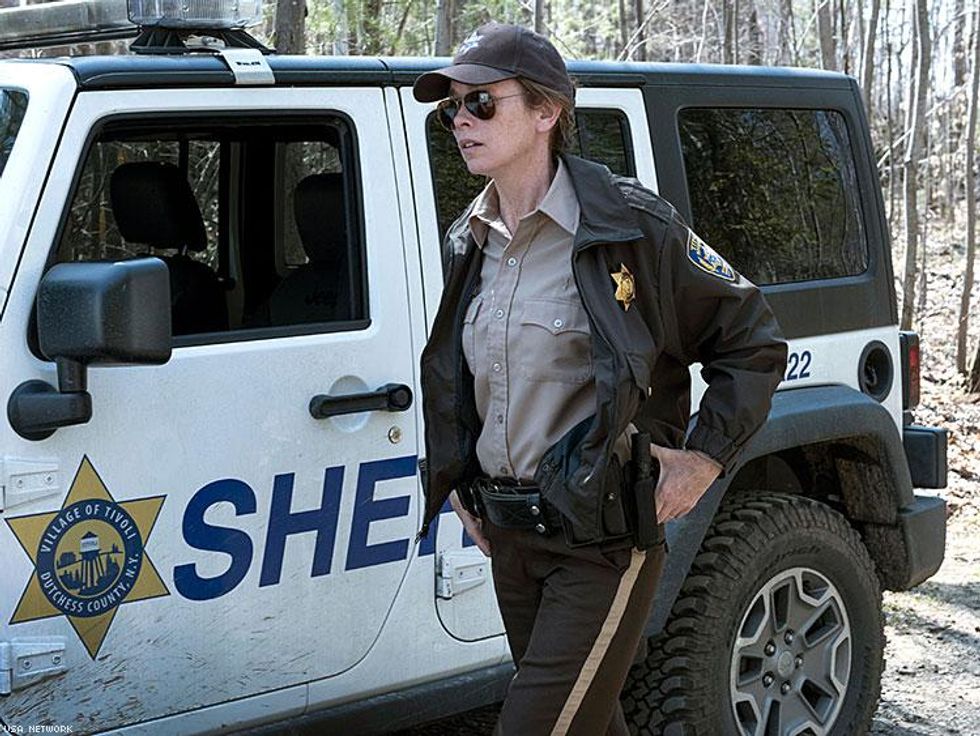In a little over a month last spring, three TV series on the CW Network killed off their queer female characters: Jane the Virgin, The Vampire Diaries, and The 100. There were more than half a dozen others in 2016, including AMC's The Walking Dead and Syfy's The Magicians. Killing off LGBT characters is a long-standing tradition on TV (and in film), as are the often senseless deaths of characters of color. (Just ask any horror-film aficionado exactly how long the black characters last; it's rarely past the first few scenes.)
TV showrunners and writers have treated LGBT characters as disposable for years now, but this year, the killing off of Lexa on The 100 (just as she and Clarke finally consummated their love) set off a firestorm of reprisals, protest, and a tiny bit of recalcitrance from the writer. AutoStraddle used the death as an occasion to release a comprehensive list of the 162 out lesbian or bisexual characters who have been killed off on TV, along with how they died. That list didn't include what they called "victim of the week" types of roles (which is already where most of the trans characters in TV have historically landed) or "patient of the week roles" (a la House and ER). And, of course, the list focused only on women.
But men, and teenage boys, are certainly no less susceptible to TV's "bury your gays" trope, even if it's used less frequently now than it was 20 years ago. That's one of the reasons I white-knuckled the first several episodes of what should be considered one of this winter's greatest new TV series, Eyewitness, on USA Network.
A 10-episode anthology, Eyewitness introduces us in the very first scenes to two teenage boys, Philip and Lukas, who accidentally witness a triple homicide while fooling around in what they had assumed was an abandoned cabin in the woods. Lukas (played with full angst by Bill Paxton's son James) is the classic jock, a popular kid with a hot girlfriend and a burgeoning motocross career. Philip (played expertly by Tyler Young, whom you might know from Gus Van Sant's miniseries When We Rise) is a gay foster kid with a -- very fairly portrayed -- bio mom in recovery; a foster father (Gil Bellows) who takes on what we've generally thought of as the "mothering" role; and a tough, discerning foster mom, Helen, who happens to be the town sheriff.

As the sheriff, Julianne Nicholson (pictued above, best known for Law & Order: Criminal Intent) subverts the role of women on TV in a way few actresses have ever been allowed. Even the badass women who are so legendary they shape TV canon must be attractive and sexually available while they do their jobs (imagine Olivia on Law & Order: SVU, for example). Nicholson completely subverts the male gaze: She's rarely out of the uniform that flattens her chest and essentially neuters her, with her hair pulled under a baseball cap, makeup that looks as if she's wearing none, freckles for days. Her communication is sparse, her role with her foster son more traditionally paternal than maternal, and her immense power -- not her tits -- is the first thing you see when she's onscreen.
There's reason for that, says creator, writer, and executive producer Adi Hasak, who adapted the series from the critically acclaimed Norwegian crime thriller Oyevitne.
"Too often women are depicted primarily through their sexuality, so it was incredibly important to me that we do a character study of Helen as a multidimensional woman," Hasak says. "My goal was to go much deeper than her sexuality and delve into her marriage, her demons, and her ongoing struggle of being a working woman in a man's world -- into her humanity."
As creator and executive producer of the NBC drama Shades of Blue, which stars Jennifer Lopez, Hasak has already created tough and nuanced female characters, but by utilizing a gay in-house director, Scott Peters (who is also a producer and has a long, storied TV career) and having Twilight director Catherine Hardwicke (whom Hasak calls "the most powerful female director in Hollywood") direct the first two episodes, he ensured that the final result is a thriller that manages to keep you guessing and questioning your assumptions about gender and sexual orientation from a uniquely feminist perspective.
He says the effect was "very intentional."
"From a young age, I've been surrounded by powerful, strong-willed women, and I am still, both at work and at home," says Hasak. "It was only natural that once I had the ability to generate my own material, I gravitated toward strong female characters. That's the case with Jennifer Lopez's corrupt detective character in Shades of Blue. And it's just as much the case with Julianne Nicholson's character in Eyewitness, which I consider a revisionist feminist western."
It's easy to see what he means. Set in Tivoli, New York (the real-life version has a population of about 1,100), the show succeeds at making even LGBT viewers question our assumptions about women and gays and their place in the world. A foster kid who is queer is rarely portrayed onscreen; nor are boys fumbling for ecstasy and falling in love in rural America. Part of the suspense of the show isn't about whether the murderer will catch the boys or whether a female cop of a certain age could actually juggle a career and family, but rather whether these closeted teens would be outed -- or worse -- in what we all assume is just some hick town. Even I, a product of a small rural town and a former foster mom, was afraid for the boys throughout.
"The moment I saw the original Norwegian version of Eyewitness, I was taken by the multiple story lines -- of the two gay teens who witness a murder, and a female sheriff of a certain age struggling with career and family, and seeing her investigation of the murder as an opportunity to add some meaning and purpose in her life," Hasak tells me. "I also felt that from a psychological point of view, the thriller story line complemented the anxiety that one of the teens was having about coming out, as well as the sheriff's anxiety over her own search for identity. In that sense, both the boys' and sheriff's stories were extremely complementary, each searching for meaning and a clear definition of their identity. And it's specifically these complementary stories that set the show apart from the usual thriller, giving me an opportunity to create the kind of character-driven series I've been wanting to do for a long time."
This kind of show could not have existed on TV just a few years ago. Not a single network would have run this show a decade ago, and yet, Hasak says, "As for the network and studio, I can't emphasize how important this narrative is to them. They've done nothing but encourage me to dramatize the story line of these two boys in an honest way."
And portraying teenage boys falling in love involves sex. Gay sex. That may turn off some viewers, but they'll be missing a damn fine series that has a lot to say but never hits you over the head with moralizing.
There's another pivotal woman on this series: Kamilah (played by Tattiawna Jones), an FBI agent with some baggage of her own. There's a subversive cat-and-mouse between the sheriff and the agent, and trust me -- online shippers will have a field day pairing these two women up, their underlying tension and attraction tantalizing. (Yes, both women have relationships with men, but that doesn't eliminate them from being bisexual.) But even without it, the tenderness and touch between them at one point shows something else we rarely see on TV: deep, abiding female friendship.
For fans of TV criticism, Eyewitness passes not just the Bechdel test but also the Mako Mori test, the Sphinx test (all measures of female characters whose story lines are not dependent on male characters), and the Vito Russo test (a queer character who "matters," with real-life qualities apart from queerness); it has at least two non-white characters in the primary cast.
But one gets the sense that Hasak and his team weren't aiming to check off boxes to be politically correct. They're aiming to tell the interlocking story of these teenage boys and this 40-something woman in a way that's honest, thought-provoking, and extraordinarily fascinating.
Of course, there's always the worry that just seeing two boys kissing -- which happens the first time early in episode one -- will turn off some viewers from even watching. Hasak says that's OK with him. "I'm very aware that there are some television viewers who will flip the channel upon the sight of two teenage boys making out. But my hope is that, as they push the button, those individuals will question their prejudices -- if only for a moment -- and that this will lead to an inner dialogue and newfound awareness of just how far we've come as a society."
Eyewitness premiers Sunday, October 16, at 10/9 c on USA Network. Watch the trailer below.



















































































Viral post saying Republicans 'have two daddies now' has MAGA hot and bothered